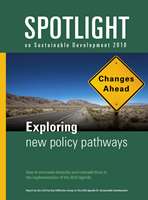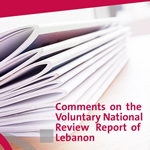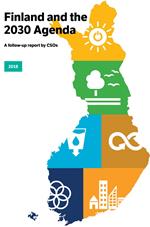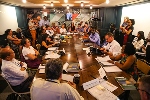Social Watch news
Published on Thu, 2018-09-13 20:03
In Benin the Social Watch-Benin network set up four working groups (social, economic, environmental and governance) to draft a parallel report to the government's Voluntary National Review which reviewed 33 priority targets selected from each of the six SDGs to be reviewed at the HLPF in 2018. Indicators were available for only six of these. The network concludes that while the SDGs “have been incorporated in the government's Programme of Action and the projects initiated by the development cooperation partners” the lack of “an efficient information system able to illustrate about implementation” risks resulting in “bitter observations, as has happened with other international commitments and conventions”.
|
Published on Wed, 2018-09-12 14:06
Bold Alternatives to Business as Usual
Spotlight on Sustainable Development 2018
Geneva Launch of the Civil Society Reflection Group Report
MONDAY 17 SEPTEMBER 2018, 1.00 – 3.00 PM; ROOM XII, PALAIS DES NATIONS
“The world is off-track in terms of achieving sustainable development and fundamental policy changes are necessary to unleash the transformative potential of the SDGs.” This is the main message of the Spotlight Report 2018.
|
Published on Wed, 2018-08-29 13:48
Lebanon participated in the Voluntary National Review (VNR) at the High Level Political Forum (HLPF) 2018, presented its progress report towards achieving sustainable development, and had its Q&A session on July 18th, 2018, at the UN Headquarters in New York.
These comments, drafted by a group of civil society organizations, are intended as a contribution to the dialogue on the harmony between Lebanon’s international commitments to international institutions and donors, on one hand, and the achievement of SDGs, social justice, and equality, on the other.
|
Published on Sun, 2018-08-26 00:00
 |
Food is at the core of the nexus between identities, health, ecology and livelihoods, an intrinsic space where different important dimensions of life converge. Yet, policy discussions and deliberations that impact on food and food systems are often fragmented and incoherent. This article explores the close connection between these different domains and offers feasible pathways on how to place the virtuous interplay between sustainable and diversified local food systems and healthy diets at the core of the public policy agenda. It argues that turning to what is defined as the Peasant Food Web is the most effective strategy to address multiple intertwined challenges and offers concrete policy proposals that can facilitate the transition to agroecology and support peasants in feeding the world through a reinforcing loop between biodiversity, nutrition, health and livelihoods. Such a strategy requires significant efforts to ‘de-silo’ the current policy approach to what are often mistakenly addressed as separate challenges and break down the artificial boundaries imposed by the institutional settings that support each of the interconnected Sustainable Development Goals (SDGs).
|
Published on Sun, 2018-08-26 00:00
The UN Committee for Development Policy has announced Bangladesh’s eligibility for graduation from Least Developed Country to Developing Country. This success also brings confidence for achieving the SDGs. In the last 15 years, with limited resources, Bangladesh has witnessed one of the fastest reductions in poverty anywhere in the world. The country has met the target in reducing the proportion of population below the national poverty line (currently 22.4%) three years ahead of time. It has reached the targets in reducing infant mortality rate from 92 per 1000 live births in 1990 to 46 now; and in decreasing the prevalence of underweight children less than five years of age from 66 percent in 1990 to 32.6 percent at present. In terms of education, the country has achieved nearly 100 percent enrollment in primary schools; and attained gender parity with more girls than boys in primary and secondary schools.
|
Published on Fri, 2018-08-17 12:15
With over a 50 year stuggle under Israeli occuptation, Palestinians’ call for the right to self-determination is not something new. Systematic and gross human rights violations they face neither.
They are daily realities for Palestinians; while their country is now being defined as “least desirable, the least inviting and the least livable place on earth1”.
However their struggle for freedom is constant. In each and every occasion they call for an immediate end to occupation and blockade of the Gaza Strip and the ethnic cleansing in Jerusalem and other places in West Bank. They urge Israeli authorities to respect all United Nations resolutions and its obligations under international law recognizing their right to self-determination. Civil society activists and human rights defenders are at the forefront becoming a voice for these calls. They advocate for international solidarity and action as well.
|
Published on Mon, 2018-07-30 16:30
New York, July 30 (GPW) – Next September 24, the UN Secretary-General, António Guterres, will outline a new private investment strategy during a high level meeting that he is convening. Under the title of “Financing the 2030 Agenda for Sustainable Development” the meeting aims at building momentum and support to mobilize public, private, domestic and international resources, to improve financial norms and standards, and to disseminate to developing countries digital technologies to help them access finances.
Details of the format and objective of the meeting were announced on Friday, July 27 by Deputy Secretary-General Amina J. Mohammed and Assistant Secretary-General Elliot Harris.
|
Published on Thu, 2018-07-26 15:41
After many years of women’s, union and human rights movements campaigning against bilateral and regional agreements known as “free trade agreements” or “trade and investment agreements”, the government of the United States of America has taken the opposite direction. President Donald Trump has imposed protective tariffs on steel and aluminum, prompting retaliatory action and sparking a “trade war” with unpredictable consequences. Trump intends to renegotiate the North American Free Trade Agreement (NAFTA) and to withdraw from the Pacific Agreement, formerly known as the Trans-Pacific Partnership (TPP), now renamed as the Comprehensive and Progressive Agreement for Trans-Pacific Partnership (CPTPP) by the eleven countries that did sign it. However, these two additional adjectives in the name do not reflect a change in the essence of the agreement pushed by Barack Obama to oppose China’s advance in the region.
|
Published on Thu, 2018-07-19 15:06
A group of CSOs share their long-term experience and knowledge of enhancing sustainable development. Each of the seven CSOs is responsible for its own area of expertise of the Finland and the 2030 Agenda follow up report.
The Finland and the 2030 Agenda follow up report provides information about the state of sustainable development in the country, describes visions about the the future and above all makes specific recommendations for decision-makers to carry out the objectives discussed in the report.
|
Published on Mon, 2018-07-16 00:00
The experience of Voluntary National Reviews and of Civil Society shadow (or spotlight) reporting.
How it is key for meaningful participation and accountability
The side event "SDG Implementation at National Level: What’s the Point of National Reports?" was held on July 17 in New York, during the meeting of the High Level Political Forum of the UN. The debate focused on voluntary national reports (VNRs) and parallel “shadow” or “spotlight” reports generated by civil society organizations (CSOs) on progress towards the Sustainable Development Goals (SDGs).
|
SUSCRIBE TO OUR NEWSLETTER
Submit

|











